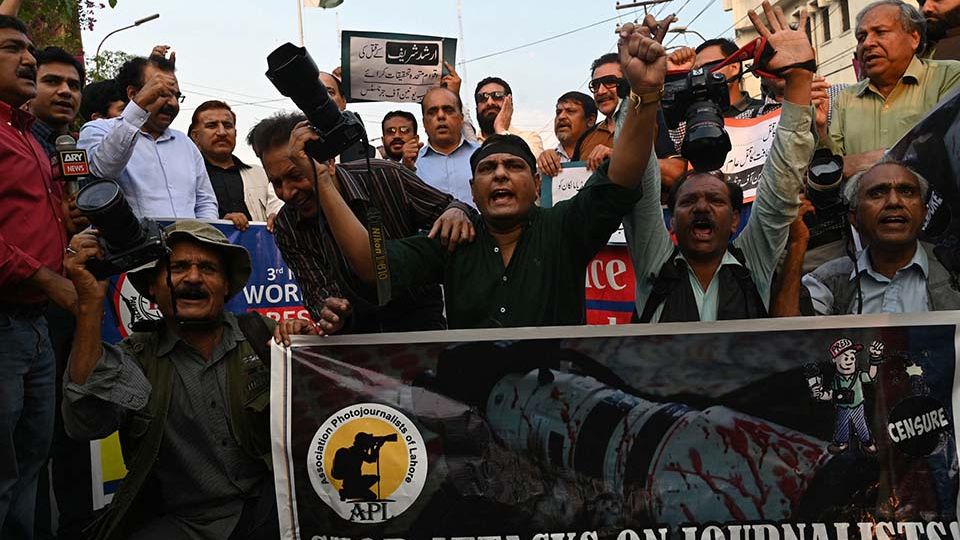May 7, 2025
THIMPHU – The media’s role in voicing public aspirations and holding power to account is under increasing threat in South Asia, according to the Asia Press Freedom Report 2024–2025.
The report paints a grim picture of shrinking media freedom and escalating risks faced by journalists across the region.
Between 2024 and 2025, at least 250 violations of media rights were recorded. A total of 69 journalists were jailed or detained, while 20 lost their lives in the line of duty.
In Bangladesh alone, the Bangladesh Federal Union of Journalists (BFUJ) reported that nearly 300 journalists and media workers were injured, many shot, during protests across the country.
Afghanistan saw at least 172 violations against journalists and media outlets, further highlighting the fragile state of press freedom.
Across the region, access to information remains a growing challenge, compounded by financial constraints, weak legal protections for journalists, government suppression, the rise of unregulated social media, and the rapid advancement of artificial intelligence.
In Pakistan, a submission to the Islamabad High Court by the Institute for Research, Advocacy, and Development (IRADA) in September 2024 revealed that more than 250,000 digital media workers were without legal safeguards for fair wages or safe working conditions.
The report observed that governments in the region are increasingly shaping public narratives through influence over media owners and editorial policies.
The situation in Bhutan also reflects this regional trend. While the government issued a guideline in April 2024 to promote transparency, journalists reported that official spokespersons were often unresponsive or ill-equipped to provide adequate information.
Yet, Bhutan stands out for its unique practice—Prime Minister and Cabinet ministers hold monthly briefings with the media, an approach rare even globally.
In India, the introduction of the Digital Personal Data Protection (DPDP) Act, 2023—meant to protect privacy—has raised concerns over access to public information. The amendment to the Right to Information Act now allows blocking of content deemed “personal information,” potentially undermining efforts to ensure government accountability.
In the Maldives, journalists face hurdles due to the Attorney General’s Office challenging compliance with information requests issued by the Information Commissioner.
Bangladesh’s transition from the Information and Communication Technology (ICT) Act of 2006 to the Cyber Security Act 2023 has brought little change in transparency.
Meanwhile, Sri Lanka’s controversial Online Safety Act continues to raise alarms for its vague language and potential to stifle free expression.
Bhutan, once ranked 33rd in 2021, has fallen to 152nd in 2025—dropping five places from the previous year and marking one of the steepest declines globally. Nepal stands at 90th, followed by the Maldives (104), Sri Lanka (139), Bangladesh (149), India (151), Pakistan (158), and Afghanistan (175).
The report also spotlighted gender disparity in media leadership, with few women in decision-making roles and widespread discrimination against women reporters. Digital media platforms such as blogs, podcasts, and YouTube channels continue to grow, but the lack of editorial oversight and professional standards remains a concern.
Job insecurity is another pressing issue. Media professionals across the region face increasing unemployment due to shrinking revenues, forced closures, and political pressure. Government interference and shrinking advertising revenues are pushing many outlets out of business.
Despite these challenges, reform efforts are underway. In Bangladesh, the interim government’s draft Media Reform Policy 2025 seeks to enhance access to information.
India’s proposed Media Transparency Bill 2024 aims to address media monopolies and regulate the distribution of government advertisements, often used as a tool to influence editorial content.
In Bhutan, a new proposal under review would introduce a fair and transparent advertisement policy aligned with market principles, while also exploring support mechanisms for independent and digital journalism.
The Social and Cultural Affairs Committee of Parliament has been tasked with reviewing media laws, assessing government interventions, and evaluating public perceptions of freedom and transparency.
In Nepal, the consolidation of state broadcasters—Nepal Television and Radio Nepal—into the National Public Service Broadcasting Agency has been welcomed as a positive step toward more accountable public media.
While efforts toward reform signal hope, the report makes it clear: without stronger protections, genuine transparency, and political will, press freedom in South Asia will continue its downward spiral.


